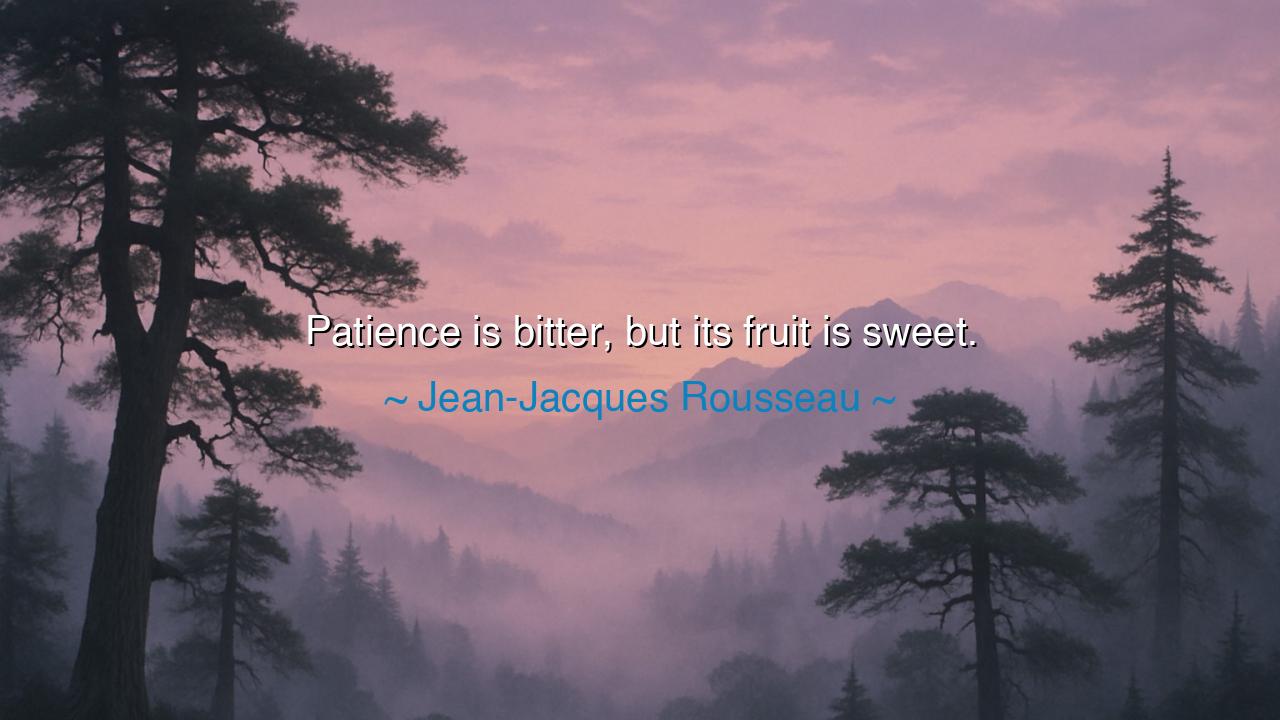
Patience is bitter, but its fruit is sweet.






Hear the words of Jean-Jacques Rousseau, philosopher of nature and soul, who declared with piercing clarity: “Patience is bitter, but its fruit is sweet.” In this brief utterance lies a wisdom as old as the soil itself, for he likens the journey of endurance to the growth of a tree: the waiting is harsh, the toil unyielding, the taste at first sharp upon the tongue—but in the end, the harvest is rich, the sweetness undeniable. Patience is no easy virtue, for it demands suffering, restraint, and silence in the face of longing. Yet those who endure discover treasures beyond what the restless will ever know.
The origin of this truth is rooted in Rousseau’s own reflections on human struggle. He knew that the human heart yearns for quick results, that the soul rebels against delay. Yet he also saw that growth, whether of the body, the mind, or the spirit, requires time. As fruit cannot ripen in a single day, so too do wisdom, love, and accomplishment require the long passage of seasons. Thus he wrote that while the waiting may be bitter, the end is sweeter than honey, for it is won not by chance but by perseverance.
The ancients spoke of this same truth. Think of the farmer who sows his seed in spring. He bends his back to the soil, waters it, and guards it, yet for many weeks sees nothing but bare earth. The sun scorches, the weeds encroach, and doubt gnaws at his mind. This is the bitterness of patience. But when the season is fulfilled and the fields are heavy with golden grain, his labor is crowned with abundance. The harvest does not come to the impatient, but to the one who waits through heat and storm. Rousseau’s words are but a modern echo of this eternal law.
Consider also the story of Nelson Mandela, imprisoned for twenty-seven long years. The bitterness of confinement could have broken his spirit, yet he endured with patience. At last, when freedom came, his fruit was not vengeance but reconciliation, a new South Africa built upon forgiveness and hope. The sweetness of his harvest astonished the world, for it showed that the long bitterness of waiting can ripen into blessings not only for oneself, but for entire nations.
The meaning of Rousseau’s saying is therefore both personal and universal. On the personal level, it reminds us that goals worth achieving—whether mastery of knowledge, healing from grief, or the building of character—are won only by enduring difficulty. On the universal level, it reminds nations and peoples that true progress comes not in haste, but in steady, patient striving, even when the present tastes bitter. Patience is the soil, and out of it grows the sweetest of fruits: peace, wisdom, and triumph.
The lesson for future generations is clear: do not despise the bitterness of waiting. When the path is long, when results are unseen, when your soul longs for the end yet the end delays, remember Rousseau’s truth. The bitterness is temporary, but the sweetness is eternal. To abandon the journey midway is to taste only bitterness; to endure is to taste the fruit.
Therefore, let your actions be thus: embrace patience not as weakness, but as strength. Endure the long struggle with faith. Plant seeds of discipline, perseverance, and hope, even when you see no fruit. Teach your children that true worth is not gained in an instant, but through time and endurance. And remember always: though patience is bitter, though it wounds the restless soul with delay, its fruit is sweet, and those who wait in steadfastness shall eat of it with joy.






AAdministratorAdministrator
Welcome, honored guests. Please leave a comment, we will respond soon